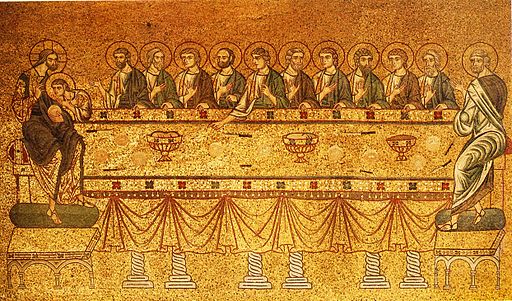Missing Verse
Easter Sunday7 (20 May 2012)
Homily of Fr. Paul Panaretos, S.J.
Jesus called individuals to join him. Jesus called individuals with different qualities and characteristics. Jesus valued their differences; Jesus never planned to have clones for his disciples. He desired they be his witnesses to continue his mission. During his Last Supper prayer for them—and for us contemporary disciples and witnesses to Jesus—he prayed his Father that they be one.Unity, and Christian unity especially, involves a variety of things; sacrifice is one. Families know that. Families are united because one will fore-go some-thing for the good of one or all. Schools know that, too. School spirit is not magic; it is shaped by students, teachers and staff, who realize the school does not revolve around any one of them. Schools are as strong as each and everyone in them. Peter knew the same about the unity of disciples.
Peter remembered when Jesus had called him he left his things and joined Jesus and his other disciples. A verse missing from the lectionary’s first reading helps us appreciate that Peter recalled leaving his things to follow Jesus; and it helps us appreciate the phrase in the first reading, Judas turned away to go to his own place.
Judas, we heard, was numbered among [the Twelve] and was allotted a share in [their] ministry by Jesus. In the verse we didn’t hear, Peter recalled for his listeners how after betraying Jesus Judas had bought a parcel of land [his place] with the1 money he received for being the guide for those who arrested Jesus. From being with Jesus and the apostles to going away...to his own place is not merely external, physical movement in space. In the Acts of the Apostles the use of possessions points to abandoning faith in Jesus or cultivating it. Judas purchased his farm with blood money for handing over Jesus, and he left the company of the apostles. Judas left his place in the apostolic ministry in which he had a share for his own place; the opposite of Peter and the others, who left their things2 to take their place with Jesus, who chose them to be apostles.
Today some of us are called to leave our things in order to witness to Jesus. All of us are to use our possessions in ways which help individuals and the common good. Our Christian use of possessions not only unites us to Jesus and to one another. Our Christian use of possessions demonstrates faith. Our Christian use of
possessions embodies what we say we believe in the creed, I believe in one, holy, catholic and apostolic church. Our place in the church helps us shape our use of our many gifts.
Risen Jesus continues praying for us to use our gifts well. Risen Jesus continues praying for us to be his apostles today. Genuine apostles willingly leave certain things, not just to endure hardship but to deepen unity and to make more credible to the world their living witness to risen Jesus. The church does not revolve around us, it revolves around Jesus; it is his body in the world.3 At the same time we are the church; we make Jesus present everywhere. We are the church more than we are in church when we gather around his altar: “The Eucharist is the memorial of Christ’s Passover, the making present and the sacramental offering of his unique sacrifice, in the liturgy of the Church which is his Body.”4
As we grow closer with Jesus, we grow in deeper union with one another and demonstrate more clearly our union by our faith put in action. Baptism not only began our union with Jesus, dead and risen, it began our apostolic life; eucharist not only deepens our union with risen Jesus, eucharist sustains what our baptisms began. Baptism began each one’s ministry, each one’s vocation, varied as ministries and vocations are. We not only serve the church and the world in our individual ministries. As we serve, we allow Jesus to place us with him and with each other in his living self-gift, his body, our church.
In your daily 15 minutes with Jesus this week
- Desire the Trinity to refresh and renew you.
- Ask St. Peter to present you to Jesus.
- Converse with Jesus: praise Jesus for dying and rising for you and for giving himself to you in his sacraments and in ways unique to you.
- Ask Jesus for grace to be aware of your baptism into him as your apostolic invitation to take your place with Jesus.
- Close saying slowly the Lord’s Prayer. His words, give us...our daily bread, call for his self-gift, which allows us to take our place with him, individually and as his body.
Link to this homily’s Spiritual Exercise
____________
- Acts 1.18.
- See Luke 18.28. Luke’s Gospel is the first part of his 2-volumes; The Acts of the Apostles is the other.
- See, for example, Colossians 1.18; 1.24.
- Catechism of the Catholic Church, 1362.
_________________________________________________________________
Wiki-image of the Last Supper is in the public domain. Wiki-image by Lyricmac at en.wikipedia of the Great Commission used by CC BY-SA 3.0.


No comments:
Post a Comment